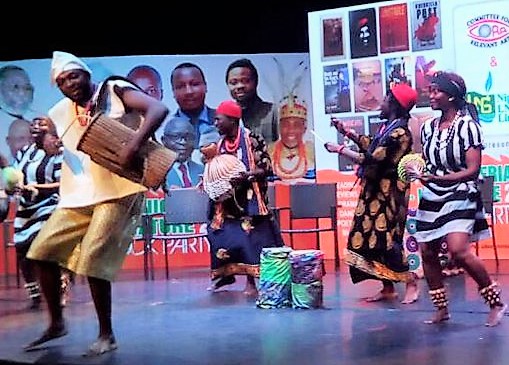
Is literature a western thing? Anyone who knows Africa would disagree. The arts of all types are thriving in Nigeria and elsewhere. In September in Lagos, book lovers gathered for the Nigeria Prize for Literature 2018, seen in the picture. It celebrates books, literature, entertainment, drama, dance, music, poetry, and reading – the full house
THINK of Rwanda and what you imagine is grotesque mass killings, and villages filled with the detritus of the Tutsi genocide at the hands of the Hutus.
But tiny Rwanda, a country of 10 million which dubbed itself the “Switzerland of Africa,” is the continent’s fastest growing state, surrounded by arable countries – the DRC, Uganda and Tanzania – with countless hectares of good land they can hardly use.
This ironic sub-text pervaded last week’s seminar at the Johannesburg Holocaust and Genocide Centre about changing narratives for African war reporting, 25 years after the genocide which killed 800,000 people in 100 days. The African roller coaster is largely quiescent now but with memories of what happened when tribalism went wild. Veteran worldwide journalists spoke at the seminar.
Do we know Africa? Jean-Philippe Remy, Africa correspondent for French daily paper Le Monde has been living and working in Africa for 20 years. He says westerners still think of the continent as one country. But it is 74 diverse countries, each with its own character.
Amazingly, in the Rwandan genocide era, even good journalists used to say smugly, ‘we know Africa’ – just like good French colonialists. It was the era of parachute journalism, where French foreign reporters would arrive, do minor investigations and write through French eyes. In a welcome change, this attitude has lessened as cellphone journalism from locals became news sources, leaving commentary and analysis for major media.
Before the present era, journalists had to cover a continent overwhelmed by conflict in Ethiopia-Eritrea, Congo, Somalia, Sudan, and elsewhere. Then, in the 2002 Kenyan elections, President Arap Moi retired after a 24-year rule. Nairobi celebrations attracted the largest crowd ever. Remy says everything changed. Later, to integrate more with its region, Rwanda even changed its alignment and language from the French to the Kenyan English one.
What about literature? Is it still ‘western’? Unfortunately, that’s the narrow way most of us see it. But from the early 2000s new African voices have emerged in countries such as Somalia and Nigeria. It has raised interest in African writing in countries such as Germany. Martin Hielscher, a specialist in fiction at a German publisher, said we can’t simply call things ‘African’ anymore, as if it’s all the same. Africa must speak for itself. African literature tends to be structured less around the linear ‘plot’ associated with western literature, but a mix of different voices.
Give the violent history of the continent, journalism must inevitably deal with African suffering. The journalist Salim Amin, who addressed the seminar, is the son of renowned Kenyan photojournalist Mohamed “Mo” Amin, who in 1984 revealed to the world the Ethiopian famine which threatened to starve 7 million people. Mo’s pictures inspired the musician Bob Geldof to organise Live Aid, a 16-hour concert for Ethiopia featuring Queen, Freddie Mercury and others. It was watched worldwide by 1.9 billion people. In a stunning success, it raised millions of dollars, and is what many adult westerners remember about Ethiopia. Salim showed the seminar a film about Mo’s work in conflict zones which kept the audience spellbound.
When President Cyril Ramaphosa appealed to Jewish youngsters at Sunday’s SAJBD conference not to leave South Africa, but help rebuild it after a ruinous decade, he knew many had already gone to places with secure futures. Most had lived here in capsules of privilege in an Africa opaque to them. They will make their new homes in America and elsewhere without being able to say, authentically, that they ‘know Africa’.
Perhaps South Africa will flower again – like Rwanda? Sadly, those emigrants won’t see it.
GEOFF SIFRIN is a journalist in Johannesburg, South Africa, and former Editor of the SA Jewish Report. Email: geoffs@icon.co.za